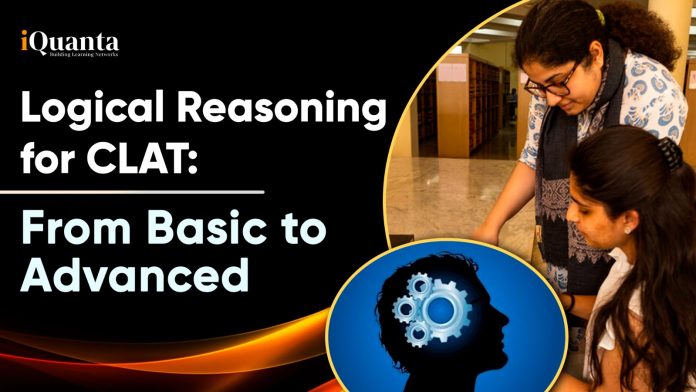Logical Reasoning questions are asked in the Common Law Admission Test to assess the candidate’s ability to analyse arguments, draw conclusions from the text and think critically in any situation. Logical reasoning is a pivotal section of the Common Law Admission Test and can never be learned through rote memorisation. Scoring in this section not only improves your chances of clearing the examination but also sharpens your ability to critically analyse a situation, which is extremely beneficial in a legal career. This blog aims to provide a complete guide from basic to advanced on logical reasoning questions, preparation strategies, tips & techniques and much more to score well in this section.

Understanding the Basics
The basics of the Logical Reasoning section require you to evaluate arguments and information from the text given. Candidates need to recognise patterns, draw inferences and solve problems based on logical principles. The typology of questions that are asked in this section is given below:
- Arguments: An argument consists of a premise and a conclusion. The primary task in this type of question is to identify both of them.
- Inference: Candidates will draw information from the given texts even if the conclusions are not explicitly stated in the text.
- Arguments: Unstated or hidden arguments that are essential to evaluate the argument’s strengths are identified from these questions.
- Strengthening and Weakening Arguments: Identifying information from the texts that will either additionally support or reject the argument.
- Deductive Reasoning: The idea of moving from a general principle to specific conclusions.
- Inductive Reasoning: The idea of moving from specific conclusions to general conclusions. These arguments are evaluated based on their strengths.
- Fallacies: It is the method of identifying the common errors in the arguments that make them invalid. This is extremely important for critical evaluation.
- Draw Conclusions: Candidates draw the most logically approved conclusion from the that follows the given premises.

Essential Skills
Every candidate must be aware of the basic skills required to assess the logical reasoning questions before moving towards the advanced ones. The essential skills required by the candidates at the foundational level are mentioned below:
- Reading Comprehension: Candidates must develop the habit of reading and understand the written texts accurately. This is important because candidates will be dealing with passages of various lengths and difficulties.
- Analytical and Critical Thinking Skills: Analytical Skills require you to break down complex information into smaller fragments that can be easily identified and understood to draw clues and relationships between them. Critical Thinking skills test the candidate’s ability to identify the objectives and biases from the judgments.
- Time Management: The CLAT Examination is a time-bound examination, so candidates need to solve the questions quickly and accurately. Develop your strategies accordingly that will help you in the examination.
Advanced Skills
Once the candidates have mastered the foundational skills, they can move towards the advanced strategies and skills required to ace the examination. The advanced strategies required for complex questions are given below:
- Diagramming Arguments: Certain types of questions require you to draw Venn diagrams and flowcharts to better understand the questions and make clear logical connections.
- Identifying the Primary Issue: In lengthy passages, candidates must quickly identify the central issue being discussed in the passage. This will help save time and focus on relevant information.
- Considering Alternative Meanings: When evaluating passages, always think about the alternative approaches. This will help you identify the weaknesses in your answers.
- Practising with varied types of questions: Expose yourself to a wide variety of questions and practice them to make flexible and adaptive strategies.
- Principle of Charity: When analysing an argument, interpret the strongest possible argument to engage yourself with the argument fairly.
Preparation Strategies
Preparing for any of the sections in the CLAT Examination requires you to prepare a flexible and adaptive preparation strategy that you can follow and modify whenever needed. Mentioned below are some tips that will help you build a scoring preparation strategy:
- Start your logical preparation strategy as early as possible. This will help you allocate sufficient time to understand the basics and then move towards the advanced questions.
- Consistently practice your weak and strong points too. Practice from a variety of questions to develop a better understanding of questions.
- Appear for mock tests and identify your weak areas. Don’t just solve the questions, understand where things went wrong, and do not repeat such mistakes.
- Do not rote memorise your questions; rather, logical reasoning is more about understanding the principles and logic of the question and applying your common sense.
- Seek guidance from experienced mentors and seniors on struggling topics and questions. Always remember to not hesitate while solving and asking questions. This will also help in ahead in life.
- In the end, believe in yourself and stay calm and positive during your journey. This will guarantee your success.

FAQs
No, the CLAT Examination does not require any prior knowledge of formal logic and tests the candidates based on their common sense. The primary focus of the logical reasoning section is to understand the structure of arguments and draw inferences from the text rather than applying any formal logic in the questions.
The common mistakes made by the candidates include misinterpretation of the information, focusing on unimportant details, and rushing while solving the questions. Avoid such mistakes to score well in the examination.
Consistency is the key to improving your speed and accuracy in any of the sections in the CLAT Examination. Start by focusing on the basics and gradually move towards the advanced questions. Analyse yourself through mock tests and work on your weak areas, also time yourself while appearing for the mock tests.
There are multiple logical reasoning-based books from renowned authors to improve your logical reasoning skills. Along with the books, you can also prepare from mock tests, previous year’s CLAT Question papers, online practice platforms, etc.
The exact weightage for each type of question varies every year. However, questions related to arguments, inferences, and logical conclusions are often seen in the question paper every year. It is important to prepare for every type of question before appearing for the examination.

